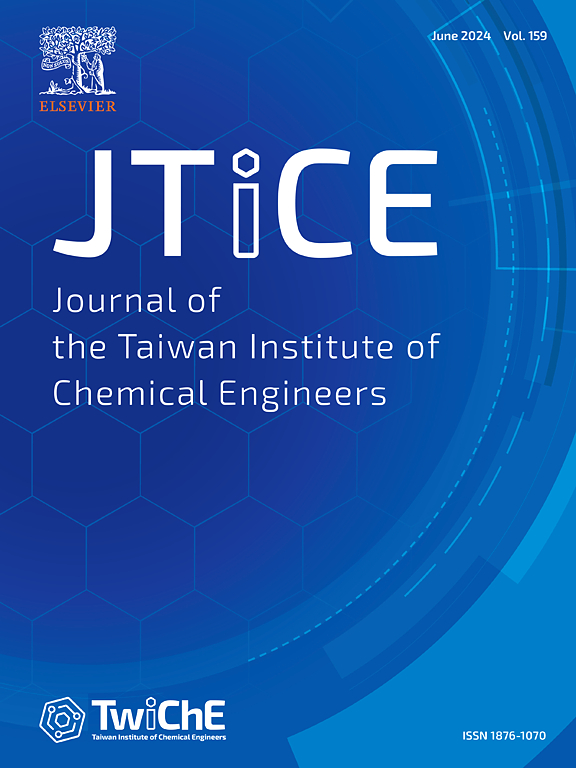Features of the behavior of nanosized catalytic dispersions in Fischer-Tropsch synthesis in slurry reactorsof the CSTR and SBCR types
IF 5.5
3区 工程技术
Q1 ENGINEERING, CHEMICAL
Journal of the Taiwan Institute of Chemical Engineers
Pub Date : 2024-11-28
DOI:10.1016/j.jtice.2024.105847
引用次数: 0
Abstract
Background
This study investigates the behavior of nanosized iron-containing dispersions during Fischer–Tropsch synthesis (FTS) in three-phase reactors of different types: CSTR and SBCR.
Methods
The catalytic activity of nanosized dispersions was studied in three-phase reactors of different types: CSTR and SBCR. Calculations of the parameters of kinetic models for different reactors were carried out using Excel 2013 spreadsheets, the physical properties of gas mixtures and liquid hydrocarbon media were carried out using built-in models of ASPEN HYSYS v 10.
Significant findings
For the first time, the influence of the type of slurry reactor on the catalytic behavior of a nanosized particles during FTS was systematically studied.
It has been established that at various temperatures, pressure and GHSV in the presence of a nanosized Fe catalysts, XCO for SBCR in most cases is close to XCO for CSTR, which is not consistent with the literature data for these reactors with micro-sized slurry catalysts.
The results of kinetic estimates indicate the presence of inhibition in the liquid/nanoparticle edge, which is hypothetically related to the dynamics of molecules of long-chain alkanes of the dispersion on this edge and may depend on the nature of the mechanical action on such a medium.

CSTR和SBCR型浆状反应器中费托合成纳米催化分散体的行为特征
本文研究了不同类型的三相反应器(CSTR和SBCR)在费托合成(FTS)过程中纳米级含铁分散体的行为。方法在CSTR和SBCR两种不同类型的三相反应器中研究纳米分散体的催化活性。采用Excel 2013电子表格对不同反应器的动力学模型参数进行了计算,采用ASPEN HYSYS v 10内置模型对气体混合物和液态烃介质的物理性质进行了计算。本文首次系统地研究了浆体反应器类型对纳米颗粒催化反应行为的影响。研究发现,在不同温度、压力和GHSV下,纳米级Fe催化剂存在时,SBCR的XCO在大多数情况下接近CSTR的XCO,这与使用微尺寸浆状催化剂的反应器的文献数据不一致。动力学估计的结果表明,在液体/纳米颗粒边缘存在抑制作用,这可能与长链烷烃分子在该边缘分散的动力学有关,并且可能取决于这种介质上机械作用的性质。
本文章由计算机程序翻译,如有差异,请以英文原文为准。
求助全文
约1分钟内获得全文
求助全文
来源期刊
CiteScore
9.10
自引率
14.00%
发文量
362
审稿时长
35 days
期刊介绍:
Journal of the Taiwan Institute of Chemical Engineers (formerly known as Journal of the Chinese Institute of Chemical Engineers) publishes original works, from fundamental principles to practical applications, in the broad field of chemical engineering with special focus on three aspects: Chemical and Biomolecular Science and Technology, Energy and Environmental Science and Technology, and Materials Science and Technology. Authors should choose for their manuscript an appropriate aspect section and a few related classifications when submitting to the journal online.

 求助内容:
求助内容: 应助结果提醒方式:
应助结果提醒方式:


